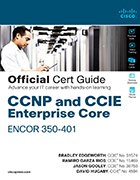How Cisco certification changes alter CCNP and CCIE tracks
Here's what to expect from the colossal Cisco certification changes to the CCNP and CCIE tracks that aim to increase material relevance and benefit network engineers' daily lives.
For the Cisco Certified Network Professional and Cisco Certified Internetwork Expert -- CCNP and CCIE, respectively -- the Cisco certification changes mean less time flaunting advanced networking tricks and more time learning material relevant to the current job market.
Cisco announced these certification changes at Cisco Live 2019, where the significant cuts to the Cisco Certified Network Associate (CCNA) track garnered much attention. However, the Cisco certification changes also affected the CCNP and CCIE tracks, such as shrinking the former eight-track CCNP options to five tracks. Authors Brad Edgeworth and Jason Gooley said they believe these changes will greatly benefit CCNP and CCIE hopefuls, as the changes reflect shifts in the networking industry and network engineer job roles.
The effects of the Cisco certification changes are reflected in the new book from authors Ramiro Garza Rios, David Hucaby, Edgeworth and Gooley -- CCNP and CCIE ENCOR 350-401 Official Cert Guide -- which is available now. The book explores the new CCNP and CCIE Enterprise tracks that include relevant information for enterprise network engineers.
Editor's note: The following interview was edited for length and clarity.
How have the Cisco certification changes affected CCNP and CCIE? What remains the same?
 Brad Edgeworth
Brad Edgeworth
Brad Edgeworth: [Cisco] is adding more width to the knowledge required. It's adding more programmability and automation, because that's becoming more integrated into teams. Also, it's trying to take advantage of more virtualized platforms.
Jason Gooley: The certifications are becoming more streamlined. They're modular, so you can pick the technology core, then focus on a specialty and become certified in that direction. In addition, newer technologies such as software-defined access [SD-Access] or software-defined WAN [SD-WAN] are part of these exams.
Not a lot was removed. The level of knowledge you had to know before has grown, because we include what was there before and add a bunch of new technologies.
Edgeworth: Cisco is going back to what is relevant to jobs. Some technologies that are not as common, like frame relay, were removed. The core fundamentals of networking still reside within the certification exams, and Cisco built on top of them.
 Jason Gooley
Jason Gooley
Gooley: You have to know what was asked [in the exams] before in addition to these new technologies. That fits with what customers see in work environments now. You're certified in what you see in the industry versus an exam with some technology you might not use. It's structured around current job roles.
When I took the CCNP, there were four exams. Now, you can take two -- technology core and concentration -- and become CCNP certified. The structure completely changed, which I think is for the better. As far as technology, things like SD-WAN, SD-Access and programmability become more robust because that's what customers and the industry are leading to.
Edgeworth: The CCNP Routing and Switching exam before was great but never took wireless into account, which is what most enterprise customers use. Now, that's integrated into it.
With CCIE, it used to be: What router ninja tricks can you do? CCIEs would maybe not have fundamentals for network design, so network design was integrated as a component of the CCIE practical exam. Design concepts have become a core specialization with CCNP, as well.
Where do you see Cisco certifications and the industry heading in the next 20 years?
Edgeworth: In the industry, there will be more automation and businesses becoming more digital. Another big thing is security. How do you integrate security throughout the service? The industry lagged with that. There's going to be more automation and security integration for dotting i's and crossing t's to make sure data is correct and maintains its privacy.
Gooley: As job roles change and customers adopt different technologies, the certifications will follow. As the certifications evolve over time, they'll follow what's in the industry and what customers go through. That's why we didn't remove a lot from the certifications, because it's still out there.
For Cisco to redo the entire certification program, as well as introduce a new line that focuses specifically on automation, software and programmability skills -- that's in response to the industry, and that's critical. When you evolve your skill set and move toward newer technologies and automation, you still need to know how it works before you automate it. You can automate failure as fast as you automate success.
Edgeworth: You have to have fundamentals because of what you automate. Learn the trade, not tips of the trade, because tips of the trade come from learning the trade.
Going after a certification is nice. Obtaining the certification is nicer. But failure is part of the process. Learning on the journey is critical. I wouldn't be where I am today if I hadn't failed. [The first time] I tried for CCIE, I failed. But the knowledge I gained during the process allowed me to enter other opportunities to grow my career. While succeeding is nice, it's about the knowledge you gain on the way.
Gooley: I went for the CCDE [Cisco Certified Design Expert] three times, and I still haven't passed. You learn the technology and best practices in going for it. Even if you don't pass, you've still enhanced your skill set, and it's valuable. Everybody eventually has to get up and dust themselves off.
What's nice about social media and the community is when you fail, you're held accountable when you say it. Then other people come out of the woodwork saying you're not alone. That helps everybody learn together. Embrace the journey. The journey is where you learn everything and have the fun.

 Click to learn more about
Click to learn more about




